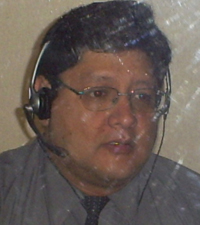interpreting for the first time: any tips? Penyiaran jaluran : Pauline7
|
|---|
Pauline7
Local time: 09:03
Bahasa Inggeris hingga Bahasa Perancis
+ ...
Hello there
I'm a press officer (graduated in languages), and I usually translate all the press material of our office. On Monday we're having a press conference and I (foolishly?) offered to interpret in English-Italian, and perhaps as well in French-Italian.
I am starting to get a bit nervous... Any advice to give (other than studying the material of the conference) ?
| | | | Jaroslaw Michalak 
Poland
Local time: 10:03
Ahli (2004)
Bahasa Inggeris hingga Bahasa Poland
SITE LOCALIZER
Ask someone (even from your family) to help you rehearse the conference, i.e. they would give the questions and answers you might resonably expect there and you will interpret them.
While it may be far from the real thing, as you never know what might happen, this might give you more confidence...
And most of all - do not worry! It will be all right!
| | | | Nuria Navarro 
Sepanyol
Local time: 10:03
Bahasa Inggeris hingga Bahasa Sepanyol
+ ...
| Practice taking notes | Mar 4, 2007 |
I am a professional interpreter and I could not interpret press conferences without taking notes. It's not necessary to write down every single word the speaker says, but just the main ideas. In this way, you feel more comfortable and you avoid huge blanks in your mind.
You can practice while you watch the news on TV, writing down the main ideas. It is also useful to make up some easy signs/symbols for the most common words, such as: everything, people, other, change, development, w... See more I am a professional interpreter and I could not interpret press conferences without taking notes. It's not necessary to write down every single word the speaker says, but just the main ideas. In this way, you feel more comfortable and you avoid huge blanks in your mind.
You can practice while you watch the news on TV, writing down the main ideas. It is also useful to make up some easy signs/symbols for the most common words, such as: everything, people, other, change, development, world, etc.
It may be also useful if you think about some of the words the speakers are going to use during the press conference, so that you can create signs for them and summarize as quickly as possible the main ideas.
And a final tip. Anytime I have to interprete before of an audience I thinks that everything is going to be fine and before I start speaking I smile. Somebody told me once that your body creates endorphines and thy make you feel good. I don't know if it is true, but it works for me!
I hope it helps and good luck for Monday!!! ▲ Collapse
| | | |
Hi Pauline,
* Before the conference make a list of the names of all the speakers so you don't have to worry about mnispronouncing somebody's name.
*Don't worry about translating every word. Try to grasp the main idea of the speaker and to render it into the target language.
* Have a notepad with you. I wouldn't advice you to note down everything the speaker says as this might be distracting. But it's always good to note down any numbers, dates, title... See more Hi Pauline,
* Before the conference make a list of the names of all the speakers so you don't have to worry about mnispronouncing somebody's name.
*Don't worry about translating every word. Try to grasp the main idea of the speaker and to render it into the target language.
* Have a notepad with you. I wouldn't advice you to note down everything the speaker says as this might be distracting. But it's always good to note down any numbers, dates, titles. Cross ou the information that is no longer needed so you don't get lost in your notes.
* Make sure they give you your own microphone possibly one that you don't have to hold in your hand.
* Try to get a seat as near the speakers as possible. Before the conference present yourself to the speakers as their interpreter. That will remind them that they have to cooperate with you.
* If you feel the speaker is speaking for too long or people are beginning to speak at once don't hesitate to interrupt politely but firmly. Even the nicest speakers seem to forget sometimes that they are interpreted!
* Try to look confident even if you do not feel confident. Speak in a steady pace, not too fast and not to slow.
Keep an eye contact with the audience. The audience won't notice minor errors but will quickly sense hesitation in your voice. Interpreting is a bit like acting!
* And finally even if you feel you have made an error or think you have missed something stay calm and continue.
Good luck and let us know how it went!
Magdalena ▲ Collapse
| | |
|
|
|
CMJ_Trans (X)
Local time: 10:03
Bahasa Perancis hingga Bahasa Inggeris
+ ...
all the advice so far is sound. Here's a bit more...
Start right now producing a concise vocabulary list in all 3 languages of the words you are pretty sure will be used. Just the fact of having done this the day before should fix those words in your short-term memory.
Don't go for complicated abbreviations at this stage: unless you are used to them, you could panic and not remember in the heat of the moment. If you have shorthand, use it - unlikely but you never know -... See more all the advice so far is sound. Here's a bit more...
Start right now producing a concise vocabulary list in all 3 languages of the words you are pretty sure will be used. Just the fact of having done this the day before should fix those words in your short-term memory.
Don't go for complicated abbreviations at this stage: unless you are used to them, you could panic and not remember in the heat of the moment. If you have shorthand, use it - unlikely but you never know - but if you do, use it in the target language, having already translated the original in your head.
Above all, before the event, talk to as many people as you can, especially members of the press likely to ask questions, which is what I assume you will be translating. If you relax and listen and ask the right questions, you should get a fair idea of what they will be saying later on. In my experience, such people are already thinking of what they will say and just talking gives them a chance to try out their ideas. All good material for you to store for later use.
During the session, if something is not clear or you do not catch something for whatever reason, do not hesitate to ask the speaker to repeat. As long as you smile and seem relaxed, it will just seem normal.
Last but not least, even if you get it all wrong, nobody is going to die, it is not worth worrying about. So relax and enjoy. it could be a fun experience. ▲ Collapse
| | | | Irene N
Amerika Syarikat
Local time: 03:03
Bahasa Inggeris hingga Bahasa Rusia
+ ...
| Before giving any advices | Mar 4, 2007 |
What is the mode of interpretation?
Simo or conference? Are you all by yourself? What is the setting - table, stand with microphone etc? Where is your physical location? Equipment required? Internal event or live broadcast?
[Edited at 2007-03-04 14:34]
| | | | lalabelle 
Perancis
Local time: 09:03
Bahasa Inggeris hingga Bahasa Perancis
| Some training "on line" | Mar 4, 2007 |
Hi,
I am doing a training to be an interpreter and what I find most useful is to try and fine some mp3/english programs to listen to (for instance on the BBC web) and interpret them simultaneously/consecutively (you can also practice note-taking that way).
Of course it is good to have enough vocabulary prepared, but the difficulty is to be able to remember or be quick enough to tell the proper word in the heat of the action (which is the main difficulty of interpreting I would say, ... See more Hi,
I am doing a training to be an interpreter and what I find most useful is to try and fine some mp3/english programs to listen to (for instance on the BBC web) and interpret them simultaneously/consecutively (you can also practice note-taking that way).
Of course it is good to have enough vocabulary prepared, but the difficulty is to be able to remember or be quick enough to tell the proper word in the heat of the action (which is the main difficulty of interpreting I would say, compared to being a translator).
Lalabelle ▲ Collapse
| | | | Jonathan Sanders (X) 
Local time: 10:03
| Tell them you can't do it and find someone else | Mar 4, 2007 |
Most of the time it would be suicide to try to interpret a conference if you haven't trained as an interpreter. Even naturally gifted people, who have otherwise good technique, often tire very quickly in simultaneous.
Press conferences are more difficult than your run-of-the-mill work group conference. They are difficult in content, and are more stressful because of the exposure.
You haven't mentioned whether they want you to do simultaneous or consecutive interpreti... See more Most of the time it would be suicide to try to interpret a conference if you haven't trained as an interpreter. Even naturally gifted people, who have otherwise good technique, often tire very quickly in simultaneous.
Press conferences are more difficult than your run-of-the-mill work group conference. They are difficult in content, and are more stressful because of the exposure.
You haven't mentioned whether they want you to do simultaneous or consecutive interpreting. Consecutive interpreting entire statements is even more stressful than simultaneous, and I've already said that it almost always takes time to build up the stamina to interpret for 30 minutes at a time in simultaneous.
You don't have to subject yourself to that. In fact, if you're not certain you can do it, you shouldn't. Don't take on assignments that you can't do. It's that simple. If you're interested in being an interpreter, there are ways to go about doing that. But if you don't know how to interpret, then don't take an (especially difficult) interpreting job. Just like you wouldn't take a plumbing job if you're not a plumber. ▲ Collapse
| | |
|
|
|
Edwal Rospigliosi 
Sepanyol
Local time: 10:03
Ahli (2004)
Bahasa Inggeris hingga Bahasa Sepanyol
+ ...
| Don't order spaguetti | Mar 5, 2007 |
Pauline7 wrote:
I am starting to get a bit nervous... Any advice to give (other than studying the material of the conference) ?
Drink only plain water, check your breath beforehand, eat light (you don't want to puke, but you don't want your stomach to grumble, either).
Have a handkerchief handy, check your appearance, talk to the lecturers a few minutes before the conference start to check speech styles and last minute details, and have fun.
| | | | Pauline7
Local time: 09:03
Bahasa Inggeris hingga Bahasa Perancis
+ ...
TOPIC STARTER
The press conference ended 10 minutes ago, and I think it went ok. Since they were not too many journalists, the atmosphere wasn't too stressful. Of course I wasn't even near the professionalism of a trained intrepreter, but I think I managed to render the ideas prettty well (and I also had my boss helping me out in case of need).
Anyway, I wanted to say a BIG THANK YOU to everyone who's advised me and helped me to calm down a bit - your advice was really really welcome !
... See more The press conference ended 10 minutes ago, and I think it went ok. Since they were not too many journalists, the atmosphere wasn't too stressful. Of course I wasn't even near the professionalism of a trained intrepreter, but I think I managed to render the ideas prettty well (and I also had my boss helping me out in case of need).
Anyway, I wanted to say a BIG THANK YOU to everyone who's advised me and helped me to calm down a bit - your advice was really really welcome !
ps: it was of course consecutive interpretation - I wasn't that foolish as to offer to do simultaneous interpretation (I had a go at it during the open days at the European Commission, so I know how difficult it is...). ▲ Collapse
| | | | liz askew 
United Kingdom
Local time: 09:03
Ahli (2007)
Bahasa Perancis hingga Bahasa Inggeris
+ ...
| I agree - don't take on something you're not trained and qualified to do. | Mar 7, 2007 |
Jonathan Sanders wrote:
Most of the time it would be suicide to try to interpret a conference if you haven't trained as an interpreter. Even naturally gifted people, who have otherwise good technique, often tire very quickly in simultaneous.
Press conferences are more difficult than your run-of-the-mill work group conference. They are difficult in content, and are more stressful because of the exposure.
You haven't mentioned whether they want you to do simultaneous or consecutive interpreting. Consecutive interpreting entire statements is even more stressful than simultaneous, and I've already said that it almost always takes time to build up the stamina to interpret for 30 minutes at a time in simultaneous.
You don't have to subject yourself to that. In fact, if you're not certain you can do it, you shouldn't. Don't take on assignments that you can't do. It's that simple. If you're interested in being an interpreter, there are ways to go about doing that. But if you don't know how to interpret, then don't take an (especially difficult) interpreting job. Just like you wouldn't take a plumbing job if you're not a plumber.
| | | | Agnieszka Hayward (X)
Poland
Local time: 10:03
Bahasa Jerman hingga Bahasa Poland
+ ...
| Feel like ever doing it again? | Mar 9, 2007 |
Pauline7 wrote:
The press conference ended 10 minutes ago, and I think it went ok.
Bravo!
Now, that you've had your first time at interpreting... would you say you feel like you might actually... like to do it again? Looking forward to it? Hating the thought of it? C'mon, share your feelings
Regards,
Agnieszka
| | |
|
|
|
| I completed an MA in Conference Interpreting and I completely agree. | Mar 14, 2007 |
Jonathan Sanders wrote:
Most of the time it would be suicide to try to interpret a conference if you haven't trained as an interpreter. Even naturally gifted people, who have otherwise good technique, often tire very quickly in simultaneous.
Press conferences are more difficult than your run-of-the-mill work group conference. They are difficult in content, and are more stressful because of the exposure.
You haven't mentioned whether they want you to do simultaneous or consecutive interpreting. Consecutive interpreting entire statements is even more stressful than simultaneous, and I've already said that it almost always takes time to build up the stamina to interpret for 30 minutes at a time in simultaneous.
You don't have to subject yourself to that. In fact, if you're not certain you can do it, you shouldn't. Don't take on assignments that you can't do. It's that simple. If you're interested in being an interpreter, there are ways to go about doing that. But if you don't know how to interpret, then don't take an (especially difficult) interpreting job. Just like you wouldn't take a plumbing job if you're not a plumber.
[Edited at 2007-03-14 20:45]
| | | | Pauline7
Local time: 09:03
Bahasa Inggeris hingga Bahasa Perancis
+ ...
TOPIC STARTER | I understand and yet... | Mar 15, 2007 |
Jonathan Sanders wrote:
Most of the time it would be suicide to try to interpret a conference if you haven't trained as an interpreter. Even naturally gifted people, who have otherwise good technique, often tire very quickly in simultaneous.
Press conferences are more difficult than your run-of-the-mill work group conference. They are difficult in content, and are more stressful because of the exposure.
You haven't mentioned whether they want you to do simultaneous or consecutive interpreting. Consecutive interpreting entire statements is even more stressful than simultaneous, and I've already said that it almost always takes time to build up the stamina to interpret for 30 minutes at a time in simultaneous.
You don't have to subject yourself to that. In fact, if you're not certain you can do it, you shouldn't. Don't take on assignments that you can't do. It's that simple. If you're interested in being an interpreter, there are ways to go about doing that. But if you don't know how to interpret, then don't take an (especially difficult) interpreting job. Just like you wouldn't take a plumbing job if you're not a plumber.
I perfectly understand the frustration of people trained in a particular skill (and therefore perfectly capable to carry out the activity related to it) when they see someone who is NOT trained somehow "stealing" their job. I do too get upset when I see people who have no teaching/language training whatsoever get to teach a language simply by virtue of being "native".
So, in an ideal world, only trained interpreters would interpret press conferences - but then in an ideal world the sector I work in (culture) would have plenty of money to spend on trained conference interpreters... Unfortunately, this isn't the case. So instead of having no interpretation service at all, we chose to have one, albeit imperfect, but functional all the same.
| | | | To report site rules violations or get help, contact a site moderator: You can also contact site staff by submitting a support request » interpreting for the first time: any tips? | LinguaCore |
|---|
AI Translation at Your Fingertips
The underlying LLM technology of LinguaCore offers AI translations of unprecedented quality. Quick and simple. Add a human linguistic review at the end for expert-level quality at a fraction of the cost and time.
More info » |
| | Pastey |
|---|
Your smart companion app
Pastey is an innovative desktop application that bridges the gap between human expertise and artificial intelligence. With intuitive keyboard shortcuts, Pastey transforms your source text into AI-powered draft translations.
Find out more » |
|
| | | | X Sign in to your ProZ.com account... | | | | | |










